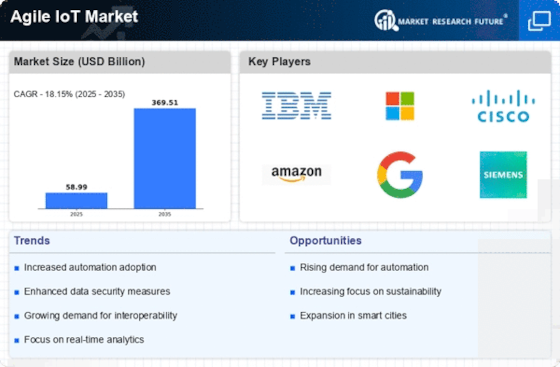Top Industry Leaders in the Agile IoT Market

Competitive Landscape of Agile IoT Market:
The competitive landscape of the Agile Internet of Things (IoT) market is characterized by a dynamic interplay of key players, each striving to carve out a significant share in this rapidly evolving sector. As organizations continue to embrace agility and IoT technologies to enhance operational efficiency, the market witnesses a robust competition among industry leaders. Key players such as IBM, Microsoft, Cisco, and Intel have established themselves as frontrunners through a combination of expansive product portfolios and strategic collaborations. These companies have consistently invested in research and development, aiming to stay ahead of the curve and address the ever-growing demands of the market.
Key Players:
- Bytelight (US)
- Fujitsu (Japan)
- Panasonic Corp (Japan)
- Qualcomm Inc. (US)
- Purelifi Ltd (US)
- Ibsentelecom (US)
- General Electronic Corp(US)
- Lvx System (US)
- Lightbee Corp. (US)
Strategies Adopted:
- Collaborations and Partnerships: Key players in the Agile IoT market have strategically formed alliances and partnerships to enhance their product offerings and market reach. Collaborations with other technology companies, IoT platform providers, and industry-specific players have become a common strategy to address varied customer needs.
- Investment in Research and Development: Leading companies continue to allocate significant resources to research and development, aiming to introduce innovative solutions. Investments in cutting-edge technologies, such as AI, machine learning, and blockchain, are geared towards staying at the forefront of technological advancements.
- Customization and Flexibility: The ability to offer customizable solutions that cater to specific industry requirements is a pivotal strategy. Companies are adapting their offerings to be flexible, ensuring they can meet the diverse needs of clients operating in different sectors.
Factors for Market Share Analysis:
- Product Portfolio: The breadth and depth of a company's product portfolio play a crucial role in determining its market share. Companies with comprehensive solutions covering various aspects of IoT, from connectivity to analytics, tend to capture a larger market share.
- Global Reach and Presence: The ability to establish a global footprint and effectively serve clients across different regions contributes to market dominance. Companies with a well-established presence in both developed and emerging markets can tap into a broader customer base.
- Customer Satisfaction and Support: The quality of customer support and satisfaction rates significantly impact a company's market share. Effective customer service, coupled with the ability to address client concerns promptly, enhances a company's reputation and market position.
New and Emerging Companies:
Amidst the dominance of established players, new and emerging companies are making strides in the Agile IoT market. Start-ups such as Particle, Helium, and Losant have gained attention with their niche offerings and agile approaches. These companies often focus on specific industry verticals or unique IoT use cases, presenting themselves as alternative options for businesses seeking specialized solutions.
Current Company Investment Trends:
- Edge Computing Technologies: Many companies are directing investments towards edge computing technologies to address the growing need for real-time processing and reduced latency. Edge computing enhances the efficiency of IoT systems by processing data closer to the source, minimizing the reliance on centralized cloud servers.
- Security Solutions: As the importance of IoT security gains prominence, companies are investing in robust security solutions to safeguard connected devices and networks. This includes the development of advanced encryption protocols, secure device onboarding processes, and comprehensive threat detection mechanisms.
- AI and Analytics Integration: Investments in AI and analytics capabilities continue to be a trend as companies recognize the value of extracting actionable insights from the vast amounts of data generated by IoT devices. Enhancing predictive analytics and machine learning algorithms has become a focal point for many players.
Latest Company Updates:
October 2023:
- October 26: Bosch acquires Kinéis, a French pioneer in satellite IoT connectivity, boosting its global reach and capabilities in low-power wide-area networks (LPWANs) for remote asset tracking and monitoring.
- October 20: Microsoft and Siemens announce a strategic partnership to develop and deploy agile IoT solutions in manufacturing and other industries, leveraging Microsoft Azure and Siemens MindSphere platforms.
November 2023:
- November 15: The Agile IoT Summit in San Francisco gathers industry leaders to discuss best practices and challenges in implementing agile methodologies for IoT projects. Key takeaways include the importance of continuous feedback loops, iterative development, and cross-functional collaboration.
- November 07:The report highlights key factors driving growth, such as the rise of edge computing, artificial intelligence (AI), and 5G technology.
December 2023:
- December 19: Samsung launches its SmartThings Agile platform, designed to simplify and accelerate IoT development for developers and businesses. The platform offers pre-built templates, drag-and-drop functionality, and AI-powered analytics.
- December 12: The Eclipse Foundation announces the formation of the Eclipse Agile IoT Working Group, aimed at establishing open standards and frameworks for agile IoT development and deployment.
January 2024:
- January 09: IBM and Ericsson partner to deliver an end-to-end agile IoT solution for the energy sector. The solution combines IBM's hybrid cloud and AI expertise with Ericsson's cellular and IoT network capabilities.
- January 05: A new report by ABI Research finds that security concerns remain a top challenge for agile IoT adoption. The report recommends implementing robust security protocols and encryption throughout the entire IoT ecosystem.










